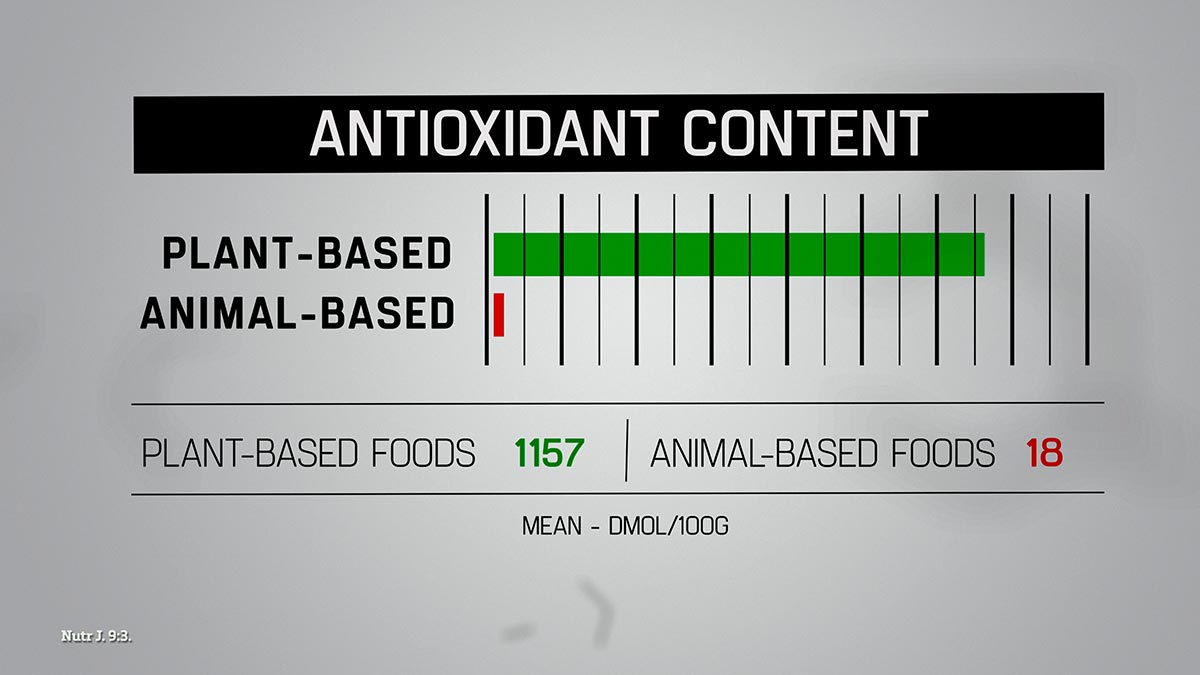

As demonstrated by the athletes and research featured in The Game Changers, switching to a diet centered around plants can yield significant performance advantages, providing optimal fuel, increasing blood flow, making muscles more efficient, and speeding recovery by lowering inflammation. These benefits can not only be experienced by athletes, but by anyone who wants to feel and perform better in any aspect of their lives.
Hard-working muscles run primarily on glycogen, a form of carbohydrate stored in our liver and muscle. Carbohydrates, which come almost exclusively from plants, also provide our brain with its primary and preferred fuel — glucose — which helps us stay sharp and focused during intense training sessions and competitions (1).
Performance-based diets built around meat and other animal products often provide dietary fat at the expense of carbohydrates (2-6). Unlike carbohydrates, fat can’t produce energy fast enough to meet the demands of intense exercise, so diets that sacrifice carbohydrates typically impair high-intensity performance (1). Low-carbohydrate diets, including the ketogenic (keto) diet, have been shown to cause so much fatigue that they even affect our motivation to begin a training session, let alone finish it (7-9).
Protein can also be used as a fuel source, but it’s highly inefficient, wasting 20-30% of each calorie as heat (10).
All told, carbohydrates are the ideal source of energy for optimized performance, whether it’s doing squats, playing football, or running a marathon.
And as we’ll discuss later in Getting and Staying Lean, despite the common misconception that “carbs make you fat”, unrefined carbohydrates — like those found in whole plant foods, including oats, sweet potatoes, and bananas — are consistently associated with decreased body fat, another advantage for most performance goals.
Efficient blood flow is another cornerstone for optimized performance, since blood is how oxygen and vital nutrients reach the cells in our muscles, brain, and the rest of our body, while also helping to eliminate waste (11).
Just as the experiment conducted on three NFL players in The Game Changers revealed, a single animal-based meal can quickly thicken our blood (12), which slows down the flow of oxygen and the nutrients blood transports to the areas that need it most, including the muscles we use during exercise (13). People who avoid meat experience the opposite effect, since plant-based meals allow blood to remain fluid and flow quickly to its destination (14).

Adding insult to injury, animal-based meals can cripple our arteries, preventing them from fully opening to allow for increased blood flow. Research has shown that just two hours after eating a heavy animal-based meal, arteries can constrict by 40%, essentially causing a traffic jam. The calorie-matched plant-based meal allowed them to open freely for quick, easy transit (15).
But it isn’t just the lack of “baggage” in plant foods that help keep our blood flowing quickly; there is also a common ingredient found in plant-based foods like spinach, lettuce, carrots, and beets that actually signals our blood vessels to open, allowing more blood to flow through at a faster pace (16). This ingredient is nitrates which, unlike the cancer-causing nitrates in cured meats like bacon (17), serves another important function.
The energy reserves our muscles use for intense training or competition are limited, and when we run out, we’ve reached the end of the line. The more efficiently our muscles work, the further these energy reserves can take us.
In addition to encouraging our arteries to expand, the nitrates found in plant foods also allow our muscles to contract more efficiently, sparing their energy reserves and allowing them to accomplish more work with the same amount of effort (18). This translates into measurably better performance, whether it’s lifting weights at the gym, playing football, or running sprints (19).
Inflammation is our bodies’ natural immune response to injury, foreign invaders, or even exercise. In its acute form, like after spraining an ankle, coming down with a bacterial infection, or recovering from a workout, inflammation is an immediate and necessary part of the healing process. Left unchecked, or further intensified, inflammation can prolong healing time from injuries or sickness, and also increase soreness and swelling, slowing recovery between workouts and competitions.
Chronic inflammation often begins with the same cellular response, but shifts in nature when the immune system fails to heal the injury effectively, eliminate the foreign invaders, or continues to respond to a threat that no longer exists. Once it reaches this stage, inflammation often begins damaging healthy tissues, including muscles and joints (20).
Taking all of this into account, unnecessary inflammation can have a significant negative impact on our physical performance (21).
Fortunately, diet can be a powerful tool to get us through acute inflammation faster and combat chronic inflammation as well. But it can also have the opposite effect.
Animal-based diets fall into the latter category. Extensive research has shown that meat and other animal products contain (or lead to the formation of) a wide range of pro-inflammatory compounds and molecules, including bacterial endotoxins, trimethylamine N-oxide (TMAO), nitrosamines, heterocyclic amines (HCAs), N-Glycolylneuraminic acid (Neu5Gc), and polycyclic aromatic hydrocarbons (PAHs) (22-26). If these words sound scary, you’re right: the damage they inflict can be severe, with research showing that a single hamburger can increase measures of inflammation by 70 percent (27).
Plants fall on the opposite end of this spectrum, coming naturally packed with high doses of anti-inflammatory compounds, including thousands of powerful antioxidants. The contrast between these two classes of food is dramatic, with plants having on average 64 times the antioxidant content of animal foods (28). This helps explain why switching to a plant-based diet can help reduce measures of inflammation by 29 percent in just three weeks (29).

Not surprisingly, numerous studies have shown that the anti-inflammatory nature of plant foods can help decrease soreness, reduce muscle damage, and support recovery — all of which contribute to improved performance (20-34).
Eating plants also combats the inflammation caused by animal foods (27,35). Therefore, decreasing animal foods while increasing plant foods has a dual effect: it not only replaces pro-inflammatory compounds with anti-inflammatory ones, but also frees up the beneficial plant compounds to address the inflammation caused by exercise, injury, and sickness (36).
The reduction in both acute and chronic inflammation reveals why so many plant-based athletes, including those featured in The Game Changers, report reduced DOMS (delayed onset muscle soreness), quicker recovery times after workouts and competitions, faster healing from injuries, reduced tendonitis and joint pain, improved immunity, and significantly increased career longevity.
Whether you’re a competitive athlete, weekend warrior, or someone who simply wants to feel and perform better in the gym, at work, or at home, eating more plants and fewer animal foods can provide powerful advantages. As we’ll see in Optimizing Health, eating a diet centered around plants can also have a dramatic effect on our health.

For more on the effect plant-based eating can have on specific areas of performance and fitness, please visit Gaining Muscle and Strength, Going the Distance, and Getting and Staying Lean.
Page References
(1) Thomas DT, Erdman KA, Burke LM. American College of Sports Medicine Joint Position Statement. Nutrition and athletic performance. Med Sci Sports Exerc. 2016 Mar;48(3):543-68.
(2) Kanter M. High-quality carbohydrates and physical performance: Expert panel report. Nutr Today. 2018 Oct;53(1):35-9.
(3) Masson G, Lamarche B. Many non-elite multisport endurance athletes do not meet sports nutrition recommendations for carbohydrates. Appl Physiol Nutr Metab. 2016 Jul;41(7):728-34.
(4) Clark M, Reed DB, Crouse SF, Armstrong RB. Pre- and post-season dietary intake, body composition, and performance indices of NCAA division I female soccer players. Int J Sport Nutr Exerc Metab. 2003 Sep;13(3):303-19.
(5) Jenner SL, Buckley GL, Belski R, Devlin BL, Forsyth AK. Dietary Intakes of Professional and Semi-Professional Team Sport Athletes Do Not Meet Sport Nutrition Recommendations — A Systematic Literature Review. Nutrients. 2019 May;11(5):1160.
(6) Nebl J, Schuchardt JP, Wasserfurth P, Haufe S, Eigen- dorf J, et al. Characterization, dietary habits and nutritional intake of omnivorous, lacto-ovo vegetarian and vegan runners - A pilot study. BMC Nutr. 2019 Dec;5:51.
(7) Butki BD, Baumstark J, Driver S. Effects of a carbohydrate-restricted diet on affective responses to acute exercise among physically active participants. Percept Mot Skills. 2003 Apr;96(2):607-15.
(8) Keith RE, O'Keeffe KA, Blessing DL, Wilson GD. Alterations in dietary carbohydrate, protein, and fat intake and mood state in trained female cyclists. Med Sci Sports Exerc. 1991 Feb;23(2):212-6.
(9) White AM, Johnston CS, Swan PD, Tjonn SL, Sears B. Blood ketones are directly related to fatigue and perceived effort during exercise in overweight adults adhering to low-carbohydrate diets for weight loss: a pilot study. J Am Diet Assoc. 2007 Oct;107(10):1792-6.
(10) Westerterp KR. Diet induced thermogenesis. Nutr Metab (Lond). 2004 Aug;1(1):5.
(11) Barnard ND, Goldman DM, Loomis JF, Kahleova H, Levin SM, Neabore S, Batts TC. Plant-based diets for cardiovascular safety and performance in endurance sports. Nutrients. 2019 Jan;11(1): pii: E130.
(12) Vogel RA. Brachial artery ultrasound: a noninvasive tool in the assessment of triglyceride-rich lipoproteins. Clin Cardiol. 1999 Jun;22(6 Suppl):II34-9.
(13) Naghedi-Baghdar H, Nazari SM, Taghipour A, Nematy M, Shokri S, Mehri MR, Molkara T, Javan R. Effect of diet on blood viscosity in healthy humans: a systematic review. Electron Physician. 2018 Mar;10(3):6563-70.
(14) Ernst E, Pietsch L, Matrai A, Eisenberg J. Blood rheology in vegetarians. Br J Nutr. 1986 Nov;56(3):555-60.
(15) Bae JH, Bassenge E, Kim KB, Kim YN, Kim KS, Lee HJ, Moon KC, Lee MS, Park KY, Schwemmer M. Postprandial hypertriglyceridemia impairs endothelial function by enhanced oxidant stress. Atherosclerosis. 2001 Apr;155(2):517-23.
(16) Domínguez R, Cuenca E, Maté-Muñoz JL, García-Fernández P, Serra-Paya N, Estevan MC, Herreros PV, Garnacho-Castaño MV. Effects of beetroot juice supplementation on cardiorespiratory endurance in athletes. A systematic review. Nutrients. 2017 Jan;9(1):43.
(17) Cantwell M, Elliott C. Nitrates, nitrites and nitrosamines from processed meat intake and colorectal cancer risk. J Clin Nutr Diet. 2017 Dec;3:27.
(18) Mosher SL, Sparks SA, Williams EL, Bentley DJ, Mc Naughton LR. Ingestion of a nitric oxide enhancing supplement improves resistance exercise performance. J Strength Cond Res. 2016 Dec;30(12):3520-4.
(19) Domínguez R, Maté-Muñoz JL, Cuenca E, et al. Effects of beetroot juice supplementation on intermittent high-intensity exercise efforts. J Int Soc Sports Nutr. 2018 Jan;15:2.
(20) Beavers KM, Brinkley TE, Nicklas BJ. Effect of exercise training on chronic inflammation. Clin Chim Acta. 2010 Feb;411(11-12):785-93.
(21) Baker ME, DeCesare KN, Johnson A, Kress KS, Inman CL, Weiss EP. Short-term Mediterranean Diet improves endurance exercise performance: A randomized-sequence crossover trial. J Am Coll Nutr. 2019 Feb;13:1-9.
(22) Erridge C, Attina T, Spickett CM, Webb DJ. A high-fat meal induces low-grade endotoxemia: evidence of a novel mechanism of postprandial inflammation. Am J Clin Nutr. 2007 Nov;86(5):1286-92.
(23) Harte AL, Varma MC, Tripathi G, McGee KC, Al-Daghri NM, Al-Attas OS, Sabico S, O'Hare JP, Ceriello A, Saravanan P, Kumar S, McTernan PG. High fat intake leads to acute postprandial exposure to circulating endotoxin in type 2 diabetic subjects. Diabetes Care. 2012 Feb;35(2):375-82.
(24) Hever J. Plant-based diets: A physician's guide. Perm J. 2016 Jul;20(3):15–082.
(25) De la Monte SM, Tong M. Mechanisms of nitrosamine-mediated neurodegeneration: potential relevance to sporadic Alzheimer's disease. J Alzheimers Dis. 2009 Aug;17(4):817-25.
(26) Ricker MA, Haas WC. Anti-inflammatory diet in clinical practice: A review. Nutr Clin Pract. 2017 Jun;32(3):318-25.
(27) Li Z, Wong A, Henning SM, Zhang Y, Jones A, Zerlin A, Thames G, Bowerman S, Tseng CH, Heber D. Hass avocado modulates postprandial vascular reactivity and postprandial inflammatory responses to a hamburger meal in healthy volunteers. Food Funct. 2013 Feb 26;4(3):384-91.
(28) Carlsen MH, Halvorsen BL, Holte K, Bøhn SK, Dragland S, Sampson L, Willey C, Senoo H, Umezono Y, Sanada C, Barikmo I, Berhe N, Willett WC, Phillips KM, Jacobs DR Jr, Blomhoff R. The total antioxidant content of more than 3100 foods, beverages, spices, herbs and supplements used worldwide. Nutr J. 2010 Jan;9:3.
(29) Sutliffe JT, Wilson LD, de Heer HD, Foster RL, Carnot MJ. C-reactive protein response to a vegan lifestyle intervention. Complement Ther Med. 2015 Feb;23(1):32-7.
(30) Tarazona-Díaz MP, Alacid F, Carrasco M, Martínez I, Aguayo E. Watermelon juice: potential functional drink for sore muscle relief in athletes. J Agric Food Chem. 2013 Aug;61(31):7522-8.
(31) Trombold JR, Reinfeld AS, Casler JR, Coyle EF. The effect of pomegranate juice supplementation on strength and soreness after eccentric exercise. J Strength Cond Res. 2011 Jul;25(7):1782-8.
(32) Hutchison AT, Flieller EB, Dillon KJ, Leverett BD. Black currant nectar reduces muscle damage and inflammation following a bout of high-intensity eccentric contractions. J Diet Suppl. 2016 Aug;13(1):1-15.
(33) Bowtell JL, Sumners DP, Dyer A, Fox P, Mileva KN. Montmorency cherry juice reduces muscle damage caused by intensive strength exercise. Med Sci Sports Exerc. 2011 Aug;43(8):1544-51.
(34) Howatson G, McHugh MP, Hill JA, Brouner J, Jewell AP, van Someren KA, Shave RE, Howatson SA. Influence of tart cherry juice on indices of recovery following marathon running. Scand J Med Sci Sports. 2010 Dec;20(6):843-52.
(35) Moreira Alves RD, Boroni Moreira AP, Macedo VS, Bressan J, de Cássia Gonçalves Alfenas R, Mattes R, Brunoro Costa NM. High-oleic peanuts: new perspective to attenuate glucose homeostasis disruption and inflammation related obesity. Obesity (Silver Spring). 2014 Sep;22(9):1981-8.
(36) Campbell TC. A plant-based diet and animal protein: questioning dietary fat and considering animal protein as the main cause of heart disease. J Geriatr Cardiol. 2017 May;14(5):331-7.